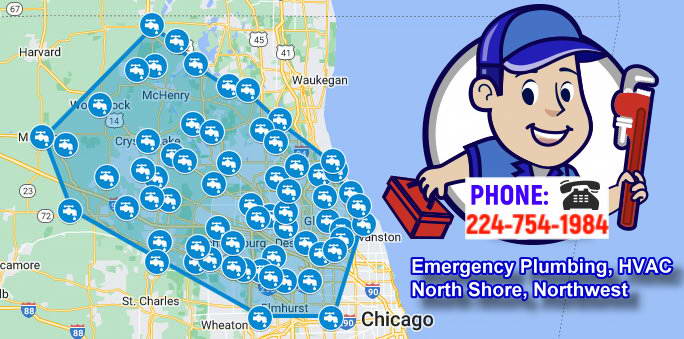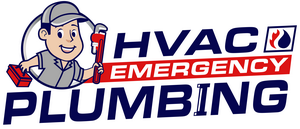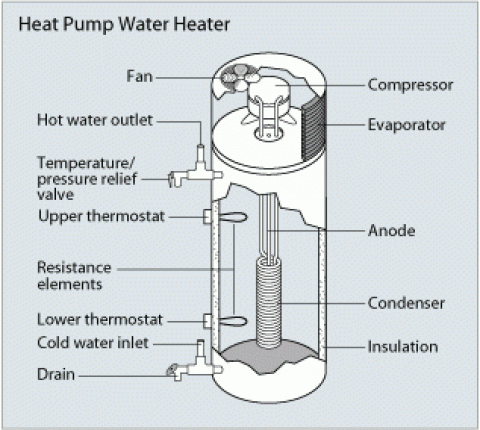Most homeowners who have heat pumps use them to heat and cool their homes. But a heat pump also can be used to heat water -- either as stand-alone water heating system, or as combination water heating and space conditioning system.
How They Work
Image
Heat pump water heaters use electricity to move heat from one place to another instead of generating heat directly. Therefore, they can be two to three times more energy efficient than conventional electric resistance water heaters. To move the heat, heat pumps work like a refrigerator in reverse.
While a refrigerator pulls heat from inside a box and sends it into the surrounding room, a stand-alone air-source heat pump water heater pulls heat from the surrounding air and transfers it -- at a higher temperature -- to heat water in a storage tank. You can purchase a stand-alone heat pump water heating system as an integrated unit with a built-in water storage tank and back-up resistance heating elements. You can also retrofit a heat pump to work with an existing conventional storage water heater.
Heat pump water heaters require installation in locations that remain in the 40º–90ºF (4.4º–32.2ºC) range year-round and provide at least 1,000 cubic feet (28.3 cubic meters) of air space around the water heater. Air passing over the evaporator can be exhausted to the room or outdoors.
Heat pump water heaters will not operate efficiently in a cold space since they tend to cool the space they are in. Installing them in a space with excess heat, such as a furnace room, will increase their efficiency.
You can also install an air-source heat pump system that combines heating, cooling, and water heating. These combination systems pull their heat indoors from the outside air in the winter and from the inside air in the summer. Because they remove heat from the air, any type of air-source heat pump system works more efficiently in a warm climate.
Homeowners primarily install geothermal heat pumps -- which draw heat from the ground during the winter and from the indoor air during the summer -- for heating and cooling their homes. For water heating, you can add a desuperheater to a geothermal heat pump system. A desuperheater is a small, auxiliary heat exchanger that uses superheated gases from the heat pump's compressor to heat water. This hot water then circulates through a pipe to the storage water heater tank in the house.
Desuperheaters are also available for tankless or demand-type water heaters. In the summer, the desuperheater uses the excess heat that would otherwise be expelled to the ground. With frequent operation during the summer, the geothermal heat pump may provide the majority of your hot water needs.
During the fall, winter, and spring -- when the desuperheater isn't producing as much excess heat -- you'll need to rely more on your storage or demand water heater. Some manufacturers also offer triple-function geothermal heat pump systems, which provide heating, cooling, and hot water. They use a separate heat exchanger to meet all of a household's hot water needs.
Selecting a Heat Pump Water Heater
Heat pump water heater systems typically have higher initial costs than conventional storage water heaters. However, they have lower operating costs, which can offset higher purchase and installation costs.
Before buying a heat pump water heating system, you also need to consider the following:
- Size and first hour rating
- Fuel type and availability
- Energy efficiency (energy factor)
- Overall costs
If you're considering installing an integrated water heating, space heating, and cooling heat pump system in your home, see our information about air-source heat pumps and geothermal heat pumps.
Installation and Maintenance
Proper installation and maintenance of your heat pump water heating system can optimize its energy efficiency.
Proper installation depends on many factors. These factors include fuel type, climate, local building code requirements, and safety issues. Therefore, it's best to have a qualified plumbing and heating contractor (or geothermal heat pump system installer/designer) install your heat pump.
Do the following when selecting a qualified professional:
- Request cost estimates in writing
- Ask for references
- Check the company with your local Better Business Bureau
- See if the company will obtain a local permit if necessary and understands local building codes.
Periodic water heater maintenance can significantly extend your water heater's life and minimize loss of efficiency. Read your owner's manual for specific maintenance recommendations.
Improving Energy Efficiency
After your water heater is properly installed and maintained, try some additional energy-saving strategies to help lower your water heating bills. Some energy-saving devices and systems are more cost-effective to install with the water heater.
A heat pump is a device that consumes work (or electricity) to transfer heat from a cold heat sink to a hot heat sink. Specifically, the heat pump transfers thermal energy using a refrigeration cycle, cooling the cool space and warming the warm space.[1] In cold weather, a heat pump can move heat from the cool outdoors to warm a house (e.g. winter); the pump may also be designed to move heat from the house to the warmer outdoors in warm weather (e.g. summer). As they transfer heat rather than generating heat, they are more energy-efficient than other ways of heating or cooling a home.
A gaseous refrigerant is compressed so its pressure and temperature rise. When operating as a heater in cold weather, the warmed gas flows to a heat exchanger in the indoor space where some of its thermal energy is transferred to that indoor space, causing the gas to condense to its liquid state. The liquified refrigerant flows to a heat exchanger in the outdoor space where the pressure falls, the liquid evaporates and the temperature of the gas falls. It is now colder than the temperature of the outdoor space being used as a heat source. It can again take up energy from the heat source, be compressed and repeat the cycle.
Air source heat pumps are the most common models, while other types include ground source heat pumps, water source heat pumps and exhaust air heat pumps. Large-scale heat pumps are also used in district heating systems.
The efficiency of a heat pump is expressed as a coefficient of performance (COP), or seasonal coefficient of performance (SCOP). The higher the number, the more efficient a heat pump is. When used for space heating, heat pumps are typically more energy-efficient than electric resistance and other heaters.
With multiple locations throughout North Shore and Northwest suburbs of Chicago, Illinois, Emergency Plumbing offers promt and professional plumbing services.
Are you looking for a reliable plumber near me in the Arlington Heights, Bannockburn, Barrington, or surrounding areas?
Our local plumbing company offers expert services, catering to all your needs. Whether you're in the heart of Buffalo Grove, the serene streets of Deerfield, or require an emergency plumber in Des Plaines or Elk Grove Village, we are here to help. Our plumbing contractors are well-versed in the unique plumbing systems of Glencoe, Glenview, Hawthorn Woods, and Highland Park.
For those in Highwood, Hoffman Estates, or the quaint town of India Creek, our team guarantees prompt and efficient service.
Residents of Inverness, Kildeer, Lake Bluff, Lake Forest, and Lake Zurich can also rely on our expertise. We extend our services to Long Grove, Mettawa, Lincolnshire, Mount Prospect, Mundelein, Northbrook, and Palatine.
Need a plumber in Prospect Heights, Ravinia, RiverWoods, Rolling Meadows, Vernon Hills, Wauconda, Wheeling, Wilmette, or Winnetka? Look no further! As a trusted plumbing contractor, we ensure that your plumbing issues are solved quickly and efficiently, keeping your home or business running smoothly.



